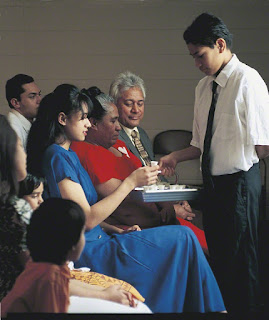Recently I heard this question: Which is worse, partaking of the sacrament unworthily, or partaking of the sacrament unconsciously?
Of course, the first scripture that comes to mind when you think of worthily partaking of the sacrament is Mormon 9:29
29 See that ye are not baptized unworthily; see that ye partake not of the sacrament of Christ unworthily; but see that ye do all things in worthiness, and do it in the name of Jesus Christ, the Son of the living God; and if ye do this, and endure to the end, ye will in nowise be cast out. (Mormon 9:29)
Many have asked the question about what this scriptures means? Elder John H. Groberg gave this council.
What does it mean give or take it the sacrament worthily? Or how do we know if we are unworthy? If we have desires to improve, which is to repent, and are not under priesthood restriction, then, in my opinion, we are worthy. If, however, we refuse to repent and improve, if we do not remember him and keep his commandments, then we have stopped our growth, and that is damnation to our souls. The sacrament is an intensely personal experience, and we are the ones who, knowingly, are worthy, or otherwise. (Elder John H. Groberg “The Beauty and Importance of the Sacrament,” Ensign, May 1989, 38.)
With that definition in mind, we can now ask ourselves what it means to take the sacrament unconsciously, or in other words, without realizing it or being aware. And, if we do, is that a bad thing? One of our problems as humans is that we have very short memories. We tend to forget. I suppose that is the purpose of this warning:
23 Take heed unto yourselves, lest ye forget the covenant of the Lord your God, which he made with you, and make you a graven image, or the likeness of any thing, which the Lord thy God hath forbidden thee. (Deuteronomy 4:23)
We take of the sacrament each week so that we don’t forget our covenants. We take it to always remember Him. When we are not continually reminded of our covenants, we drift quickly into iniquity.
8 Thus we see how quick the children of men do forget the Lord their God, yea, how quick to do iniquity, and to be led away by the evil one. (Alma 46:8)
The problem with partaking of the sacrament unconsciously is not that we are committing some sin, but rather that we are making ourselves more susceptible to sin. I believe that is why we are commanded in D&C 59:9-13 to go to church each week.
9 And that thou mayest more fully keep thyself unspotted from the world, thou shalt go to the house of prayer and offer up thy sacraments upon my dholy day;
10 For verily this is a day appointed unto you to rest from your labors, and to pay thy devotions unto the Most High;
11 Nevertheless thy vows shall be offered up in righteousness on all days and at all times;
12 But remember that on this, the Lord’s day, thou shalt offer thine oblations and thy sacraments unto the Most High, confessing thy sins unto thy brethren, and before the Lord.
13 And on this day thou shalt do none other thing, only let thy food be prepared with singleness of heart that thy fasting may be perfect, or, in other words, that thy joy may be full. (D&C 59:9-13)
Perhaps one more scripture will help us understand this principle of remembering. Doctrine and Covenants 27:2 shows that the Lord is less concerned about the mechanics and logistics of the sacrament than he is about the purpose of the sacrament. He just wants us focus our “eyes” on him and take some time each week to remember what He did for us.
2 For, behold, I say unto you, that it mattereth not what ye shall eat or what ye shall drink when ye partake of the sacrament, if it so be that ye do it with an eye single to my glory—remembering unto the Father my body which was laid down for you, and my blood which was shed for the remission of your sins. (D&C 27:2)
So, which is worse, partaking of the sacrament unworthily, or partaking of the sacrament unconsciously? Perhaps it isn’t a matter of degrees of badness. Perhaps it is simply a case of missing the mark in different ways. In either case, some personal re-commitment and correction is appropriate. If we feel our worthiness is in question, then it is a matter of improving and repenting. If, on the other hand we sit in during the sacrament thinking about or doing things that distract or prevent us from the purpose of the sacrament, then we have also missed the mark, and an opportunity. But more important, when we actively seek to remember and renew our covenants each week, we are blessed with increased protection and strength to avoid sin and iniquity. President Henry B. Eyring sums it up beautifully when he said:
If we partake of the sacrament in faith, the Holy Ghost will then be able to protect us and those we love from the temptations that come with increasing intensity and frequency. The companionship of the Holy Ghost makes what is good more attractive and temptation less compelling. That alone should be enough to make us determined to qualify for the Spirit to be with us always. (Henry B. Eyring, “The Holy Ghost as Your Companion”, October 2015 LDS General Conference)

